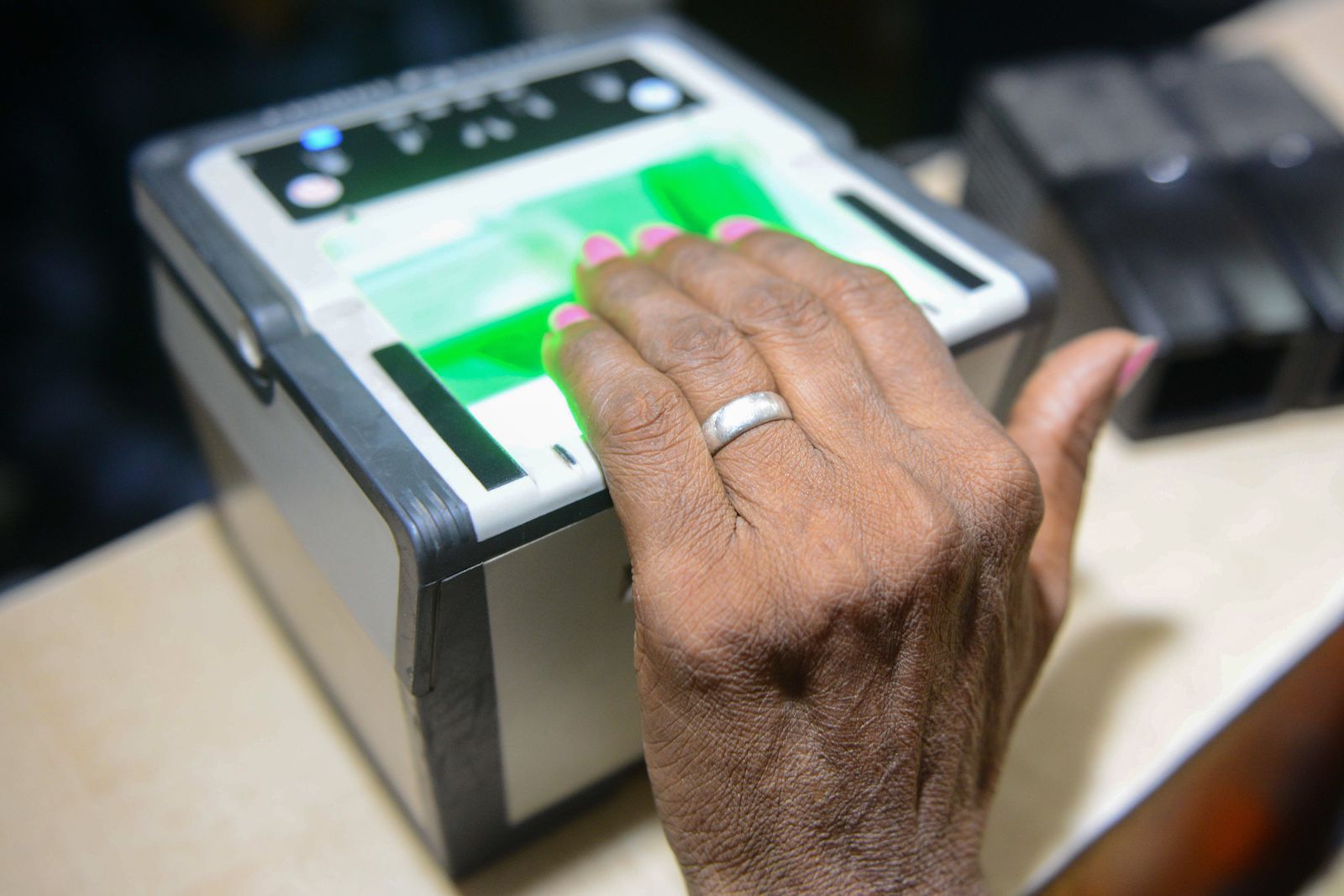The Digital Accelerator: Revving Up Government in Asia

A woman gets her fingerprints read during the registration process for Aadhaar cards (or unique identifier cards) in Amritsar, India. The identification system links to various social programs, including subsidies on liquefied petroleum gas.
Photo: Narinder Nanu/AFP/Getty Images
Asia’s digital revolution shows no signs of slowing down. From e-commerce giants, like China’s Alibaba and Japan’s Rakuten, to ride-hailing and digital payment tech startups, like Indonesia’s Go-Jek and India’s Paytm, and the widespread use of industrial robots for manufacturing, digitization is changing the way the region’s businesses operate.
It is also transforming the way governments operate. Thanks to digitization, policymakers have greater access to timely and accurate data. With better information, governments can design and implement better policies, such as improving tax compliance and the efficiency of government spending.
Indeed, Asia’s governments’ use of digital technologies in public finance management is directly transforming the lives of millions of people. But to fully reap the digital dividend, policymakers will need comprehensive policy actions on multiple fronts.
Benefits from E-Government
Critically, digitization can make governments fairer and more efficient. India’s experience with the Aadhaar is a case in point. It is the world’s largest biometric identification system that provides a unique 12-digit ID number for 1.2 billion residents in India.
The identification system links to various social programs, including subsidies on liquefied petroleum gas. In 2013, the government linked Aadhaar beneficiaries’ numbers to the liquefied petroleum gas program, which helped prevent claims from ghost beneficiaries or multiple claims. In addition, the government transferred subsidies directly to the Aadhaar-linked bank accounts, bypassing dealers and improving its support of those in need.
Additionally, the Philippines’ digital registry—Listahanan—serves as a gateway for as many as 52 social programs, ranging from cash transfers to emergency assistance, with 75 percent of the population registered. In Indonesia, digital social registries appear to have also helped expand the coverage of conditional cash transfer programs.
Even in countries where digitization is in its infancy, initiatives are on the rise. Digitization can improve public service delivery. For instance, Bangladesh uses smart water meters to monitor water quality. Digital initiatives can also help in public financial management—for example, Bhutan’s e-Tool has helped standardize project appraisal and selection for public investment.
The benefits go beyond spending. On the revenue side, e-filing, e-payments, and e-customs initiatives in tax administration are common in Singapore, Malaysia, Vietnam, Indonesia, and Thailand, and they are paying off. In Malaysia, ongoing efforts in e-filing and e-payments have reduced compliance time by 30 percent.
Challenges of Going Digital
These digital initiatives bring large gains to governments, but there are also critical and urgent challenges to address.
First, the popularity and necessity of digital technologies across the region mean that more people are at risk of cyberattacks. Hackers have used their digital skills to steal private information and disrupt government functions. A digital world is also a target-rich environment for fraudsters, including in cryptocurrency exchanges.
Second, digitization of the economy could, in principle, reduce tax revenues. For example, instead of staying in hotels that charge a tax, tourists may use digital platforms to stay in private homes. These small-business transactions may fall below the thresholds for taxation—resulting in loss of revenue for the government. The digital economy also makes it easier for tax avoiders to move profits abroad, out of reach of tax authorities.
Third, more than half of those without access to the Internet live in Asia. While broadband subscriptions have increased in the region, there is a widening gap between leaders and their less-advanced peers. For example, less than one percent of Myanmar’s inhabitants have access to fixed broadband networks compared to over 25 percent in Singapore. E-government can only work if people have access to it.
Finally, some countries have leapt ahead, while others are far behind. South Korea, Singapore, Japan and Malaysia rank in the world’s top ten in terms of digital government. India outperforms advanced economies, on average, while China, Sri Lanka, Indonesia, and Thailand outperform their emerging-market peers.
At the same time, small islands and fragile states have struggled to make significant advances in e-government. In Myanmar, Tuvalu, and the Marshall Islands, digitization still needs a boost. Ongoing applications of digitization in the region, far-reaching and diverse, show such a boost is possible.
Overcoming Digital Roadblocks Will Require Shifting Gears
The good news is that the right policies can help governments prevent fraud and cyberattacks, as well as boost digitization benefits. Singapore and Malaysia, for example, have established agencies to oversee cybersecurity strategy and operations.
Governments should also remain vigilant and protect their revenues. This requires governments to monitor areas where digitization impacts revenues. For example, if digitization shifts some services to smaller firms that fall below the tax threshold, the government may choose to revisit and change current thresholds to allow them to tax similar activities.
Further advancing digitization can also improve tax collection and, as a result, revenues, by making it easier for governments to collect data on financial transactions. This is particularly true for developing and emerging economies, whereby closing half the distance to the digitization frontier could bring in more than one percentage point of GDP of value-added tax revenue in ASEAN economies.
Countries with populations that do not have reliable access to the Internet should enable early investments in digital infrastructure, like broadband technology, to ensure inclusion and to reap the benefits of digitization. For all countries, this would require building fiscal institutions to manage the design, planning, budgeting and implementation of policies.
With these policies, Asian economies would continue to drive the digital revolution and advance the frontier, not only for themselves, but for other government innovators across the world.
This piece was first published on the IMF Blog.






